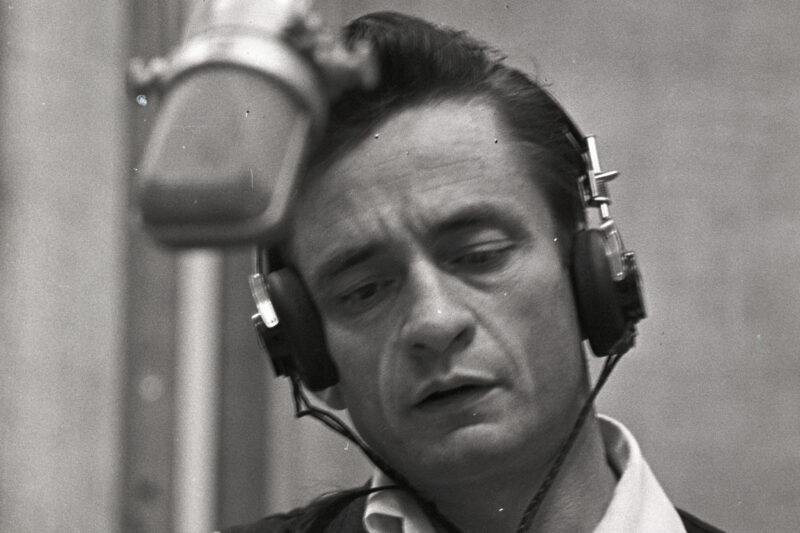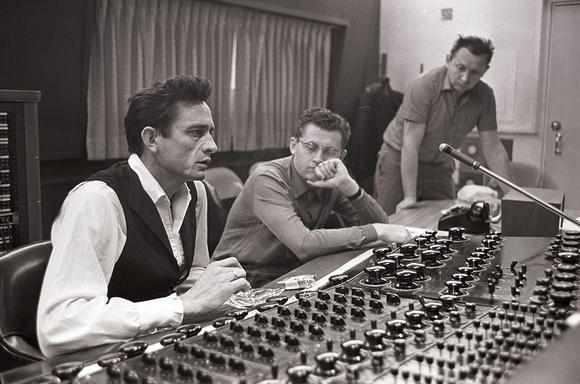'Where Are Your Guts?': Johnny Cash’s Little-Known Fight for Native Americans


In 1964, Johnny Cash released a Native American-themed concept album, “Bitter Tears: Ballads of the American Indian.” In an incredible but little-known story, Cash faced censorship and backlash for speaking out on behalf of native people — and he fought back.
A new documentary airing this month on PBS, “Johnny Cash’s Bitter Tears,” tells the story of the controversy. For the album’s 50th anniversary, it was re-recorded with contributions from musicians including Kris Kristofferson and Emmylou Harris, and the documentary also chronicles the making of the new album.
ACLU Senior Staff Attorney Stephen Pevar, author of “The Rights of Indians and Tribes,” had a chance to ask writer/director Antonino D’Ambrosio about the film.
Why did you feel it was important to make this film, and what were you hoping to accomplish?
First and foremost, the film and the story it tells deals with the movement for civil rights and, even more deeply, human rights. There is a tendency in this country to think that these movements are a thing of the past and, coming out of the 1960s in particular, that they were somehow addressed and resolved with everyone living happily ever after.
In fact, the opposite is true. These movements never cease, and it’s important to be reminded that this is indeed the case. A truly democratic society requires participation and hard work in regard to ensuring that human and civil rights are protected, uplifted, and always expanded. The movement never ends. This is most especially true for native people, who have become entirely invisible even though their issues — treaty rights, sovereignty, etc. — remain continuously under siege.
The current Supreme Court, for example, is no friend of native people and their treaty rights, even though treaty law is one of the five principle areas of U.S. law. They have shown a willingness, and perhaps an eagerness, to take up cases that violate treaty laws in what amounts to illegal land grabs, a tried-and-true historical tactic that I reveal in the film. After all, many thousands of acres of native land — a sovereign country —are seen by some with a singular interest: rich for exploitation of natural resources and ultimately for development.
Additionally, there are a few things I hoped to achieve with this film. I wanted to provide much-needed illumination surrounding the native plight within a historical and cultural context, but I also wanted to bring forward a powerful creative response from the past that very much speaks to our present and future.
Johnny Cash’s decision to place himself squarely in the middle of the fervent social upheavals of the time was not taken lightly. Cash immersed himself in the issues surrounding the native movement using the penetrating songwriting of little-known folksinger Peter La Farge, who was the first singer signed by iconic producer John Hammond to Columbia Records, who would sign Bob Dylan six months later. La Farge’s music spoke directly to the human condition in a way, as musician Bill Miller says in the film, as “being truthful, and powerful, and poetic in a modern world. And Johnny Cash comes in and takes it, and makes it fly, and gave it wings.” It’s a reminder that even though the specific details of our lives may be different, we all share life’s outline. It’s a demand that we all accept our responsibility as citizens of the world and participate in making that world work better for everyone.


%3Ciframe%20allowfullscreen%3D%22%22%20frameborder%3D%220%22%20height%3D%22384%22%20src%3D%22https%3A%2F%2Fwww.youtube.com%2Fembed%2FxJGXDYJtmFI%3Fautoplay%3D1%26autoplay%3D1%26version%3D3%22%20thumb%3D%22%2Ffiles%2Fyt_johnnycash-film.jpg%22%20width%3D%22580%22%3E%3C%2Fiframe%3E
Privacy statement. This embed will serve content from youtube.com.
What motivated Johnny Cash to make the album?
Since the very beginning of his career in 1954-1955, Cash wanted to make a concept record dedicated to the struggle of native people, which I explore in great detail in my book, “A Heartbeat and a Guitar: Johnny Cash and the Making of Bitter Tears.” His great motivation comes simply from his early life growing up with native people in Arkansas. His family’s terrible struggle with poverty and deprivation was abated a bit thanks to the New Deal program of resettlement, which provided the Cash family a plot of land to live on and farm in Dyess Colony Resettlement Area in Mississippi County, Arkansas.
Cash saw the dire contrast to what his family was able to experience and that of the native people around him, who were living in near squalor and destitution — thanks in large part to the failure of the U.S. government to honor treaties. Also, for a long period he aligned himself so closely to native people that he often claimed to be native, which he wasn’t and refuted much later in his life. It really came down to a clear, basic mantra for Cash: If any group of people face injustice and are denied their rights, then there is no freedom or justice for any of us. In the letter, Cash made it clear: “I would sing more of this land but all of God’s children ain’t free.”
What was the extent of the resistance to the album when it was released? Were any stations playing it?
This was 1964. The country was white hot with unrest. The looming presidential election was contentious and filled with often abominable, dangerous rhetoric. For example, Arizona Sen. Barry Goldwater, the Republican candidate, spoke openly of inciting nuclear war when he proclaimed, “Let’s lob one into the men’s room at the Kremlin.” He also strongly opposed civil rights, asserting, “Extremism in the defense of liberty is no vice. And moderation in the pursuit of justice is no virtue.”
This fraught political environment filled the executive suites at Cash’s label and programming booths of many radio stations with fear. While Columbia honored the contract to ship a minimal amount of records for sale, they undertook a type of “soft censorship” where they did no promotion and just ignored its existence. And of course, many radio stations just refused to play it. When Cash learned of all the opposition, he made it his mission to get the record out there. He bought back thousands of copies of the record, penned a protest letter that he placed as an ad in “Billboard” magazine, stuffed the letter inside each record, and traveled around the country hand delivering the record to radio stations and asking them to give it a chance. A line from the opening paragraph from the letter says it all: “DJs, station managers, owners, etc., where are your guts?”

Photo credit: From Antonino D’Ambrosio’s film, Johnny Cash’s Bitter Tears
What was behind the record company’s actions? Did they or the radio station owners ever explain themselves?
Columbia Records just wanted the hits to keep coming. In 1963, Cash had massive hits with “I Walk the Line” and “Ring of Fire.” They saw Cash’s attempts at concept records as money losers, even vainglorious indulgences even though the label promised Cash that when he joined Columbia that he could explore the ambitious recordings he was blocked from producing while at Sun Records. It was this promise that allowed them to sign him in the first place. And along the way, Cash pioneered concept records years before The Beatles got the credit. As musician Steve Earle explains in the film, “I never didn’t know who Johnny Cash was, but I didn’t realize until I was grown that Johnny Cash was making concept albums like 15 years before The Beatles ever thought about it.”
After the massive hits of 1963, the label could no longer stall Cash’s efforts to finally record a native concept record comprised entirely of folk protest songs. This was essentially a decade in the making for Cash, and he poured all of himself into it, explaining: “I dove into primary and secondary sources, immersing myself in the tragic stories of the Cherokee and the Apache, among others, until I was almost as raw as Peter. By the time I actually recorded the album I carried a heavy load of sadness and outrage.”
And that outrage only grew when he learned that radio stations across the country refused to play the record. Again, this was the height of the civil rights movement and many in the record industry, particularly in the South and Midwest, couldn’t accept Cash adding his voice to the protest. Some felt he was co-opted by the Northeast liberal intelligentsia, others by the left-leaning folk movement, and others just didn’t like the music and its theme of native issues, a people they deemed to be lower than Black people.
To what extent was Johnny Cash’s career hurt by the album?
It was mixed. On a personal level, he was bitterly disappointed by the opposition to the record. It’s one of the reasons that he always played a few of the songs from the record at every concert the rest of his life. It was Cash’s ongoing protest. On a creative level, the label made it very difficult for him to ever undertake a record of this kind again — even though he broke out with his live album “At Folsom Prison” four years later in 1968, which was the year that the American Indian Movement was born. But it was not an entire record held together by a theme and a narrative, with every song dedicated to a specific social justice issue. Essentially, “Bitter Tears” would be the last record of that kind Cash would ever do. Yet, this record revealed the true courage of an artist thinking out loud and telling painfully real stories that paved the way for Cash to do other protest songs such as “Man in Black” years later.
Cash refused to endure what he deemed as a cowardly censoring and suppressing of his work. In his Billboard ad, he referenced the single from the album, a folk ballad written about the native U.S. marine Ira Hayes immortalized in the Iwo Jima flag-raising photograph. Cash wrote, “‘Ballad of Ira Hayes’ IS strong medicine. So is Rochester — Harlem — Birmingham and Vietnam… I had to fight back.” He saw it as one movement: human rights. Rosanne Cash told me this was a lesson. It still is.

Photo credit: Sony Masterworks
How would you compare the reception of the re-recording with the release of the original?
The reception for the re-recording, “Look Again to the Wind: Johnny Cash’s Bitter Tears Revisited,” was also mixed. Recently, Sony Masterworks’ Chuck Mitchell and I half-jokingly discussed that in some ways this new record suffered the same fate as the original, which is another reason that the reception of the film at festivals around the world and now by PBS has been so inspiring. In any creative endeavor, particularly one that is a creative response, there is always a chorus that wants to drown out the voices of those whose suffering has been buried to maintain the illusion that what was done to get here was noble and honorable. But we, as one people, are imbued with everything that has come before — that is our history. Those ghosts don’t remain in the past but rattle around us in the present waiting for someone to listen and to unleash their spirit so they can finally be heard. Many people, including those in indigenous communities here and abroad, have expressed that this project in some way heals and gives peace but also rouses action. And that has been quite humbling.
This album was released in 1964, when the civil rights movement for Black people was occurring. Many people might say that Black people have achieved more progress from their efforts than Native Americans have from theirs. Do you think this would be a good subject to explore in the future?
Yes. This film is the first in a series exploring these issues. And this particular historical moment seems to demand it with so much underway with regard to revising and erasing uncomfortable historical truths. I continue to work with many of the native artists, thinkers, advocates involved in the film and book and beyond to craft that next film and further amplify what remains muted.
The film ends by asking, “Why?” What do you think the answer is to that question?
Whenever you pull back the curtain on the spit-polished version of American history and reveal the bodies, the butchery, the spilled blood that led us here, there is always a backlash because power is built upon using and then crushing the dispossessed and marginalized, the groups first stomped on to attain power. We can see the insidiousness of this ideology all around us today in our politics and our culture. So for me, and I think many of the artists involved in this book, record, and film, it’s less about answering the question, “Why?”, and more about asking the uncomfortable, difficult questions not permitted to be asked: “Why not?” To deny history — our real history — prevents democracy from taking root and flourishing.

Photo credit: From Antonino D’Ambrosio’s film, Johnny Cash’s Bitter Tears
There were nearly 400 Indian treaties, and nearly all of them were broken the way the Seneca Treaty was broken. Why did you happen to select that one?
In the history of this country, there is perhaps no more egregious, flagrant, and wanton abuse of law than that of treaty law by the U.S. government. And it was important for me that treaty law was explained. Both in how it was grossly violated and how it served as the heart of the native movement by distinguishing it from the civil rights movement.
In one of the most impactful and thoughtful interviews I conducted for my book, the late musician and American Indian Movement activist John Trudell explains:
“In my mind, the Indians could never have a civil rights movement. The civil rights issue was between the Blacks and the whites, our issue was around law. It was legal. There are five kinds of law in America: common law; criminal law; constitutional law; statute law; and treaty law. That’s important to note — treaty law is one of the five principal laws in America. The agreements that the United States made with the tribes were legal agreements. So our movement was based around treaty law and making sure these were upheld and not broken. This isn’t about morals and ethics — I mean, of course it is to a degree — but the United States has a legal responsibility to us. So in the end this is about the law.”
The Seneca Treaty is one of this country’s oldest treaties. I selected it because, as a subject for La Farge’s songwriting and Cash’s imaginative interpretation, it serves as a devastating metaphor for all treaty violations. In the late 1950s and early 1960s, grand public works projects were very popular — many of them were unnecessary boondoggles including the building of the Kinzua Dam on Seneca land in upstate New York. This was also a time where the terrible policy of termination was beginning to be used as a political weapon to undermine native sovereignty. Many engineers, land use experts, and esteemed journalists provided mountains of evidence that this dam was not only unwarranted but also a human rights and environmental catastrophe. New York Times theater critic Brooks Atkinson, outraged by the patent land-grab, used his “Critic-at-Large” column to bring attention to the tyranny the Seneca faced. “For the moral question is one no one dares face: Is the Kinzua Dam right or wrong? It is wrong,” Atkinson wrote.
The song that chronicles all of this in the film is called “As Long As the Grass Shall Grow.” The title reveals everything, as it takes the language directly from the treaty: “as long as the grass shall grow and the waters flow…as long as the sun rises and sets” this treaty would stand, respected and protected, forever. It did not. Again, Trudell puts a fine point on it when he told me movingly: “If you’re a nation of laws, then you have to respect this. And if you don’t respect these treaties, then we get that you’re not really a nation of laws. It’s all about the rule, and if you don’t adhere to that then it’s all bullshit.”
For PBS air dates, please visit: http://www.pbs.org/program/johnny-cashs-bitter-tears/


